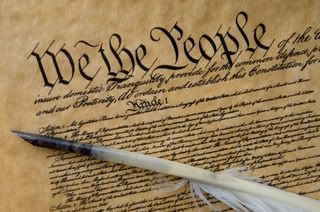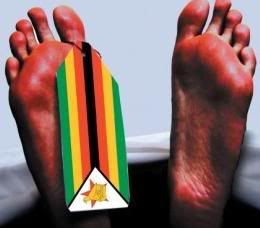 Zimbabwe appears to be on the brink of finally getting rid of Mugabe and establishing proper democracy. At the very least, Mugabe's party has lost control of the parliament, but still has 94 of the 210 seats, with the main Opposition party only two ahead on 96. So it is hardly a crushing defeat for him - but a defeat nevertheless.
Zimbabwe appears to be on the brink of finally getting rid of Mugabe and establishing proper democracy. At the very least, Mugabe's party has lost control of the parliament, but still has 94 of the 210 seats, with the main Opposition party only two ahead on 96. So it is hardly a crushing defeat for him - but a defeat nevertheless.
We can all hope that this result means that the end is nigh for the tyrant Mugabe. We can all hope that Zimbabwe can at last go down a democratic - and hopefully less economically destructive - route in to the future.
Mugabe should accept the defeat and step down. If he forces a Presidential run-off vote, he will almost certainly be humiliated. And if he doesn't, he will just end up with the same result as in Kenya - certainly not a good thing for anyone. But if he steps down now, he can ensure a better future for Zimbabwe and a less damning legacy of his own regime*.
This is an opportunity for Zimbabwe to move in a new, democratic, and brighter future. Let's hope that opportunity is grabbed with both hands.
* Less damning, but damning nevertheless.
02 April 2008
A Democratic Zimbabwe?
13 March 2008
Fewer MPs?
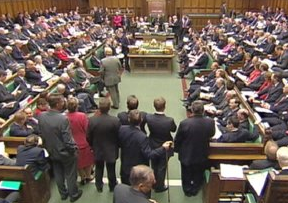 Nick Clegg proposes such a plan. Now the flippant answer to this is simple "remove the Lib Dems, then". But this doesn't answer the question. And besides, there never will be 150 Lib Dem MPs to remove.
Nick Clegg proposes such a plan. Now the flippant answer to this is simple "remove the Lib Dems, then". But this doesn't answer the question. And besides, there never will be 150 Lib Dem MPs to remove.
On a serious note, Clegg's justification doesn't work. He wants to remove 150 MPs from the Commons - taking it to around 500 - to save money. Well, primarily to save political parties from having to raise money from big donors. Let's have a little pop quiz:
So why do political parties raise money?So Clegg's idea that fewer MPs equal less need for party fund-raising just doesn't make sense... especially since he also wants more state money to go to political parties. Which would eat up the £30m savings he said would be generated by cutting the number of MPs. There is, of course, another way of saving money - cutting MPs salaries or expense allowances.
a) To pay MPs
b) To run the rest of the party
c) So they can swan off on holiday
The idea of cutting the number of MPs also raises other questions - such as the potential impact on democracy. Is fewer MPs a goof thing? Not in and of itself. If anything, actually, more of a bad thing as MPs become more and more distant from their constituents. Any reduction in the numebr of MPs would have to be matched in devolution of powers to local councils, or as part of a proper devolution system - equal English, Scottish, and Welsh parliaments.
The plan to reduce the number of MPs sounds good in a press release or a speech, but in reality it isn't much cop. The downsides of the loss of representatives simply isn't worth the tiny amount of money that is [supposedly] to be saved.
Posted by
ThunderDragon
@
10:20 pm
![]()
Labels: Democracy, Nick Clegg, Parliament, Party Funding
07 March 2008
An EU Referendum: We The People
 As the news informs us that MPs have decided not to allow us a democratic vote on the Lisbon Treaty...
As the news informs us that MPs have decided not to allow us a democratic vote on the Lisbon Treaty...
Referendums and Democracy
Referendums are a form of direct democracy, whereby we the people answer a yes-or-no question on a subject of importance. In some countries, such as Switzerland, referendums are standard events. In others, such as here in the UK, they really aren't. After all, we have had only one referendum ever. Which just happened to be on entry to what is now the EU.
Referendums are important events, no matter how often they are carried out, and just become even more important the rarer they are. After all, the last referendum decided that we would be members of the Common Market, which has become the EU without we the people getting another vote. Even though the last vote was held a decade before I was even born.
Posted by
ThunderDragon
@
6:18 pm
![]()
Labels: Democracy, EU, We The People
15 February 2008
A Written Constitution: We The People
 My We The People column, now up at the Wardman Wire:
My We The People column, now up at the Wardman Wire:
Jack Straw is hinting that the government wants to draw up a written Constitution for the UK, with a process that could take up to 20 years. But why does Straw want to do this? Becausemost people might struggle go put their finger on what [their] rights are or in which texts they are located. The next stage in the UK's constitutional development is to look at whether we need better to articulate those rights which are scattered across a whole host of different places and indeed the responsibilities that go with being British... [And to] bring us in line with most progressive democracies around the world.But why on earth does this mean that we should have a written Constitution?!
What Is A Constitution?
A constitution is basically the rules by which the democratic system of the nation state is run. Th is can either by an "unwritten", though in reality this more means "uncodified", constitution which relies on accepted conventions in order to run or a formalised, written Constitution.
Britain has an uncodified constitution, not an unwritten one. Pretty much every bit of it exists written down, in documents such as the Magna Carta, the 1689 Bill of Rights, and the Parliament Acts. The British constitution also exists in every single piece of legislation ever passed by Parliament, since there is no division between primary and secondary legislation. It also exists in common law, treaties with foreign powers, and analaysis and commentary made by experts [such as Bagehot]. But it also exists in conventions, which guide the way in which the system works - one convention being the role of Prime Minister.
America is the prime example of the written Constitution. It has a piece of paper which lists the rights and responsibilities of Americans, and is very hard indeed to modify. These kind of Constitutions are typically created after war or revolution, in order to satisfy the populace that their rights are defended.
Posted by
ThunderDragon
@
8:49 am
![]()
Labels: Democracy, Go Read, We The People
08 February 2008
MPs and Democracy: We The People
 The Wardman Wire has seen some very good articles over the past week on the subject of MPs and the money they claim, both as salary and expenses. It's not my intention to weigh in on that debate, but use the opportunity to examine the role of MPs in our democracy.
The Wardman Wire has seen some very good articles over the past week on the subject of MPs and the money they claim, both as salary and expenses. It's not my intention to weigh in on that debate, but use the opportunity to examine the role of MPs in our democracy.
Britain - and all of the democratic world - uses the representative form of democracy. We elect representatives, in our case Members of Parliament (MPs), to represent us on the national level. They are supposed to be our "voices" and to work out the best things to do and laws to pass for us.
However, they are not delegates, like Edmund Burke pointed out. They are not elected to repeat the findings of polls and the like verbatim. They are elected to use their brains. We expect them to look deeper into the issues and examine them closely and make decisions from the basis of that. We have them to do that because we the people don't have the time or inclination to do so. And certainly not for every little thing. They are charged with the responsibility of acting in the interests of the people and given the power to do this - between elections, when the power is returned to the people for a short period while they decide on the next set of representatives.
But why not just vote of things ourselves?
Democracy isn't, of course, necessarily reliant in principle of the use of representatives. Direct democracy, sometimes referred to as "pure democracy" is the idea that we the people should vote directly on everything. This simply does not exist in the real world on a national level [Switzerland is the closest, but still a long way off], however, due to the simple practical
It is possible to work when there are tiny electorates, such as Rousseau's idea of a town meeting under a tree to discuss policies, but when an electorate increases beyond a number able to meet together easily, this becomes impractical. Until technology advances enough to make e-voting a real possibility, direct democracy is nothing more than a pipe-dream.
Read the rest at the Wardman Wire.
Posted by
ThunderDragon
@
12:04 pm
![]()
Labels: Democracy, Go Read, Parliament, We The People
25 January 2008
We The People: Proportional Representation
 Another instalment of my We The People column over at Wardman Wire. I'm delaying what had been intended to be the first posts for this column yet again because this story caught my eye, and I felt in the mood to write about it. So here it is:
Another instalment of my We The People column over at Wardman Wire. I'm delaying what had been intended to be the first posts for this column yet again because this story caught my eye, and I felt in the mood to write about it. So here it is:
The Proportional Representation voting system has been rejected by ministers because it wouldn't boost turnout:
The report said PR had resulted in more parties being represented in the devolved administrations but also had a tendency to produce coalition governments.
If PR was introduced in Westminster elections, constituencies could be represented by more than one MP, said the review.
But there is no guarantee PR would increase turnout in a general election or make Parliament more diverse, the report says.
It also warns that it could cause complications between the House of Commons and the House of Lords." (BBC)
Very basically, PR is a voting system by which seats in the legislature is supposed to be very closely matched to votes. In a pure PR system, a party who gets 35% of the votes also gets 35% of the seats. Of this, this isn’t always possible in real life, where there are often minimum vote percentage requirements for a seat - examples of this is the 4% minimum in Sweden and the 1.5% limit in Israel - hence votes don’t always equal seats.
The idea behind PR is to equally distribute seats according to votes, to make the legislature a ‘true reflection’ of the voter’s intentions. But what it also does is almost certainly mean that there isn’t a majority.
A Bad Thing For The UK
PR would be a bad thing for the UK. It simply would not work within our political system. To replace the plurality [first-past-the-post] system we use with proportional representation would be a disaster. We need to have a party with a majority in parliament for our government to work. We have a parliamentary system, and thus the government is inextricably linked to parliament. It is from parliament that it gains it’s legitimacy and power.
The 'Westminster model' political system requires effective government. If there is no majority held by one party in parliament, the government cannot govern. The very oppositional nature of our political system that goes with it ensures that. Coalitions do not work - Britain has never had a coalition government outside of wartime, even when the opportunity has arisen...
Posted by
ThunderDragon
@
10:46 pm
![]()
Labels: Democracy, Go Read, We The People
23 January 2008
The Council of Europe's report said the British voting system was "open to fraud", particularly with postal votes. (BBC)
Posted by
ThunderDragon
@
8:43 am
![]()
Labels: Democracy, Election, Random News, Vote
22 January 2008
Liberal Democrats Opposed To Democracy
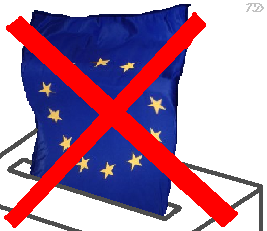 Nick Clegg has broken his party's 2005 manifesto commitment to supporting a referendum on the EU
Nick Clegg has broken his party's 2005 manifesto commitment to supporting a referendum on the EU Constitution Treaty. He is, however, following on from Ming Campbell, who also opposed letting the people of Britain vote on the one piece of legislation which will dictate how this country works for the foreseeable future. Clegg said:
The principle at stake here is: are we going to carry on doing what the Conservatives are doing? Playing games with the treaty itself, which let's remember is in effect a series of amendments to a sort of edifice of treaties already in place? Do you do that? I do not believe that is right, which is why we will not be voting for a referendum on the treaty.
The "Lisbon Treaty" as it is now called is not "a series of amendments to a sort of edifice of treaties already in place" but far more than a codification of existing treaties - and even that would be subject to a referendum, just like any codification of the British constitution would have to be - since it provides the very foundations of the removal of sovereign power [even if, as some claim, that has already begun] in the creation of an EU President and Foreign Minister.
Quite simply, Clegg's refusal to push for a referendum on this puts the lie to the very name of his party - the Liberal Democrats. Maybe that's why there are rumours of him wanting to change to to the "Liberal Party" instead?
The idea of a referendum is not about getting the treaty voted down, but about democratic legitimacy. If a popular vote has been held, no-one who opposed the treaty can possibly argue against it being ratified and becoming law. If we the people vote for the treaty then those of us who oppose it would accept it. But if it is passed through a Parliament which promised to hold a referendum on this when it was voted in refuses to meet it's promises, then the opposite will happen.
Such large changes as proposed by the "Lisbon Treaty" require a referendum - or at least it should in the eyes of any true believer democrat.
UPDATE: At least all Lib Dems aren't as anti-democratic as their leaders [via DK].
UPDATE 2: Norfolk Blogger yet again shows why his blog is one of the few Lib Dem blogs I bother to read.
Posted by
ThunderDragon
@
8:34 pm
![]()
Labels: Constitution, Democracy, EU, Liberal Democrats, Nick Clegg, Vote
21 January 2008
Not Even MPs Allowed To Vote On EU "Treaty"
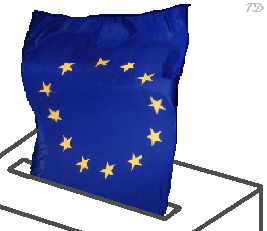 Even MPs are being denied the ability to vote on the EU Constitution - sorry, Lisbon Treaty - now.
Even MPs are being denied the ability to vote on the EU Constitution - sorry, Lisbon Treaty - now.
Only hours before the start of a debate on the bill ratifying the treaty, the Speaker, Michael Martin, decided not to allow a vote on the rebel amendment signed by 18 Labour MPs...
This evening's vote will be on whether the bill should have a second reading. The Conservatives are planning to vote against and the Liberal Democrats intend to abstain. (The Guardian)
Yes, we're living in a European Democracy... Not.
Posted by
ThunderDragon
@
10:36 pm
![]()
Labels: Constitution, Democracy, EU, Parliament, Vote
Electorate Not Fit For Purpose?
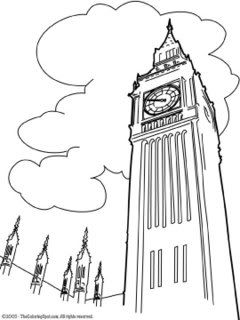 Is this really the speech that all politicians would like to make?
Is this really the speech that all politicians would like to make?
I appreciate that you can't be bothered to vote, join a political party or teach your kids to be socially responsible. You're far too busy with all that binge-drinking and spree shopping. ..
Voters, enough is enough. You're ignorant, stupid, selfish and hypocritical. Quite clearly, you're unfit for purpose. Resign, I say, resign. (Read the whole thing at First Post)
The core point of this satirical column is that the people aren't pulling their weight in the democratic system. But the whole point of the democratic system is that the people decide - even if they decide not to vote. If people aren't voting, that is something that our elected representatives have to think about - how to get people to the ballot box.
The electorate may not be perfect, but certainly neither are our elected representatives or our political system. But to call any of them specifically not "fit for purpose" is to go too far.
Hat-tip: Kerron Cross
Image: The Coloring Spot
04 January 2008
We The People: Kenyan & Pakistani Democracy
 It's a week earlier, and on a different topic, than I had intended, but here is my first We The People column for the Wardman Wire, on the recent problems in Kenya and Pakistan:
It's a week earlier, and on a different topic, than I had intended, but here is my first We The People column for the Wardman Wire, on the recent problems in Kenya and Pakistan:What could be called crises of democracy has occurred in Kenya and Pakistan, both accompanied by bursts of violence - one caused by the assassination of an opposition political leader, and another by alleged and suspected electoral fraud. Neither of these countries have a highly developed or deeply-embedded democracy, and are still riven by tribal differences. Fifty Kenyans have died in a torched church - a place normally regarded as a safe-house - because they were members of the same tribe as the President.
Read the rest...
But are there really crises of democracy in these two countries?
Posted by
ThunderDragon
@
6:21 pm
![]()
Labels: Democracy, Kenya, Pakistan, We The People
31 December 2007
Is Pakistan Even Ready For Real Democracy?
 This may seem controversial, but it doesn't really seem very much so to me at the moment. That the assassination of Benazir Bhutto has left a void in Pakistani politics shows that the political leadership in Pakistan is still weak and massively personality focused.
This may seem controversial, but it doesn't really seem very much so to me at the moment. That the assassination of Benazir Bhutto has left a void in Pakistani politics shows that the political leadership in Pakistan is still weak and massively personality focused.
What also makes me doubt Pakistan's devotion to democracy is the choice of replacement for Benazir Bhutto as leader of the Pakistan People's Party - her 19 year old son, Bilawal Bhutto Zardari. I mean, a nineteen year old who is still at university?! Have they really got no-one else? Why do they need a Bhutto at the head of the party so much that he even has to change his name? To me, that doesn't demonstrate a readiness for real democracy.
After all, if any of the party leaders in the UK was assassinated, there would always be several people who could step into the role. It certainly wouldn't lead a "void". And neither would there be any call the son - or any other relation - of the now-deceased leader to take over.
Pakistan may well be ready for democracy, as in electing who they want to lead them, but it certainly doesn't appear to me like they are truly ready for or capable of what I would regard as real democracy with all that that entails within the political system.
What does need to happen, however, is that this election goes ahead - maybe not on the original date, but with only a short delay at most.
21 December 2007
We The People: A Wardman Wire Preview
I thought that I would write a bit more about my new bi-weekly column starting in the new year: We The People. Even though I haven’t had the opportunity to actually start writing it yet! ...Go read the rest.
The basis of We The People will be democracy - in theory and in practice. I am going to try and look at different democratic and governmental systems and analyse them together and in comparison with each other and in relation to the next section of this post...
Posted by
ThunderDragon
@
8:49 pm
![]()
Labels: Democracy, Go Read, We The People
13 December 2007
Signing The EU "Treaty"
Anyone got any Tippex?
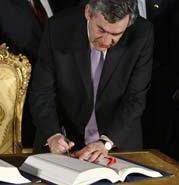 So Gordon Brown has signed the EU
So Gordon Brown has signed the EU Constitution "Reform Treaty" today, even if several hours after everyone else had. But the point I want to make here doesn't rely on whether you are pro, anti, or ambivalent towards the treaty, or whether you support parliament or the people deciding whether or not we should sign up to it.
The point is simple: why has Brown - or any other national leader - signed the treaty before it has been ratified?
Whether you think that parliament or the people should vote on it, they have not yet, so why has it been signed? What right does any government have to sign this sort of treaty [or any sort of treaty] before it has been ratified? Until the vote has been cast, the outcome cannot be known. It can be guessed, but not known.
You could claim that Brown's signature was signalling the intent of the current British government to push for ratification of the treaty, but you would be wrong. Intent can be signalled by means other than a signature on the bottom of a document.
As Brown has already signed Britain up to the EU Constitution "Reform Treaty", what can he do if parliament declines to ratify it? Say "oops, anyone got any Tippex?" Simply, signatures should be applied to a treaty only after it has been ratified. No matter how you believe it should be ratified, if you claim to be a democrat then you can't support this.
Sources: BBC, The Times, The Telegraph, The Guardian
Posted by
ThunderDragon
@
9:50 pm
![]()
Labels: Constitution, Democracy, EU, Gordon Brown, Vote
07 December 2007
We The People
Coming Soon To The Wardman Wire
 As announced earlier by Matt, starting in the new year the I will be starting a new bi-weekly column at the Wardman Wire focusing on Democracy, both as a theory and in practice, in January. New year, new column.
As announced earlier by Matt, starting in the new year the I will be starting a new bi-weekly column at the Wardman Wire focusing on Democracy, both as a theory and in practice, in January. New year, new column.
As Matt says:
I wonder if one of the keys is not “thoughtful” blogging, but “slower” blogging...
One reason for posting now, is that we are thinking about what to with the column in the intermediate weeks.
There are several different things that we could do (and we’ve put out a few feelers):
- Guest pieces.
- Find a complementary and contrasting writer.
- We could even have a guest for each “term”.
Posted by
ThunderDragon
@
10:27 pm
![]()
Labels: Democracy, We The People
04 December 2007
Shut Up, Chavez
 Venezuela's President Hugo Chavez been told to shut up - and not by the King of Spain this time. But, instead, by the people of Venezuela, who have voted against his plans to officially turn their country into a socialist state. Why? Because Chavez's policies are not working:
Venezuela's President Hugo Chavez been told to shut up - and not by the King of Spain this time. But, instead, by the people of Venezuela, who have voted against his plans to officially turn their country into a socialist state. Why? Because Chavez's policies are not working:
With foreign oil companies forced to withdraw or pay high taxes, Venezuelan oil production has dropped well below the Opec limit of 3.3 million barrels a day.
Many fear the next five years could see more economic difficulties. (The Telegraph)
This is an example of democracy in action - just not the sort of democracy they wanted [h/t Daniel Hannan]. That even a country which has elected Chavez several times votes against becoming a socialist state, preferring democracy over the socialistic imitation, just proves that 'the people' everywhere do not want socialism, despite the usual suspects claims to the contrary.
The people of Venezuela have told Chavez to shut up over his constitutional plans. Hopefully he now will.
Source: The Telegraph, BBC
03 December 2007
Ain't No Democracy Like A Russian Democracy...
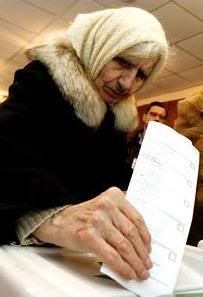 Russia's parliamentary election has been declared "not fair" by a joint observer team of the Organisation for Security and Co-operation in Europe (OSCE) and the Council of Europe. They said that the Russian election
Russia's parliamentary election has been declared "not fair" by a joint observer team of the Organisation for Security and Co-operation in Europe (OSCE) and the Council of Europe. They said that the Russian election
[There were] abuse of administrative resources... [and] media coverage [was] strongly in favour of the ruling party...
[The polls] took place in an atmosphere which seriously limited political competition... [and where] there was not a level political playing field. (BBC)
Democracy simply takes time to sink in in real practice. Claiming to be a democrat is easy, and ever since democracy has become the only acceptable political philosophy, evidenced by the absurd claims of democratic belief from people such as Mugabe and his ilk. And, of course, there were elections under Communism - except the only candidates allowed were approved Communist ones.
Democracy doesn't exist simply through a democratic system being put in place. It requires an acceptance of the principles and actually putting them into practice. Russia hasn't yet reached that stage. It's democracy is still too young and still not deeply embedded. In time, it will. But not yet. And it appears not while Putin is still around - in any capacity.
Source: BBC
22 November 2007
No Longer 'Made In Britain'?
 The EU seems to want to scrap any national food labelling, and replace it with a "Made in the EU" label. It is unacceptable that such a thing is even considered. The EU should stay out of everything like this. It is nothing to do with them at all.
The EU seems to want to scrap any national food labelling, and replace it with a "Made in the EU" label. It is unacceptable that such a thing is even considered. The EU should stay out of everything like this. It is nothing to do with them at all.
That they could even consider it shows their inherent desire to expand and expand into all governmental competencies and beyond. And it is just wrong, especially since they have no direct democratic mandate for this expansion. At all.
No-one has given their consent for the EU to inexorably expand. No-one. Whether or not you think the EU and its continuing expansion is a good thing, if you are - or proclaim to be - a democrat, then you cannot accept it under the current conditions. Referendums are essential to decide this.
Source: The Telegraph
21 October 2007
EU Referendum And Party Politics
 The Conservatives will use the Lib Dems lack of interest in a referendum on the EU
The Conservatives will use the Lib Dems lack of interest in a referendum on the EU Constitution Reform Treaty against them at the next general election, William Hague said:
This issue is one on which the Conservatives and Lib Dems could have actually defeated the government, but both the declared candidates for their leadership have ruled it out. As Norfolk Blogger, who to his credit accepts that the Conservatives should use this against Lib Dem MPs, says: "What a wasted opportunity" for the Lib Dems.
To those such as Bob Piper, who say that:
Heath took us into a Common Market with no referedum [sic]....
Thatcher signed the Single European Act with no referendum...
Major signed the Maastricht Treaty in 1992 (Oh, and he never had a referendum)...
But two wrongs do not ever make a right. It was wrong not to hold referendums before. It is just as wrong - if not more so - not to hold one now. Saying "the Tories didn't hold one!" is no argument for democracy. Since, I believe, Labour were claiming that we should have had referendums then this was their chance to put that belief into practise. But they bottled it because they didn't think they'd win.
18 October 2007
Very Nearly An Ex-Parrot
This is an ex-sovereign nation! Or at least it will be as soon as Gordon Brown signs it away.
We want a referendum. 69% of the country wants a referendum - that doesn't mean that 69% want to vote no, but that 69% want to vote on whether Britain should sign up to the EU Constitution Reform treaty. The result of any referendum is far less important than having one - so that it is the British people who decide, not a Prime Minister who got into his current position without any voting at all.
Brown won't have a referendum because he fears he'd lose it, just like he feared he'd lose a general election, and so didn't hold one. Which, of course, most Tories are secretly very pleased about. But a referendum on this EU "treaty" is essential, no matter what your view on the EU is, so long as you believe in democracy.
This is very nearly an ex-sovereign nation, but this is certainly an ex-parrot:


